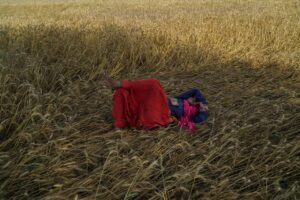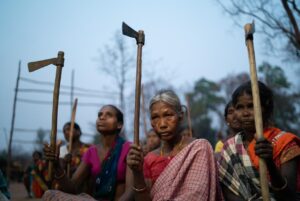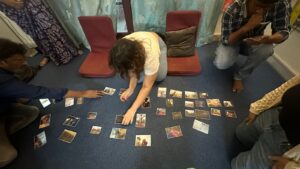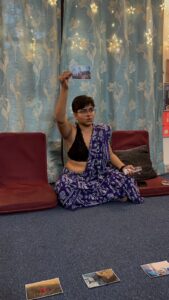Climate Change, Caste, Gender, and Mental Health by Bhumika Saraswati
Reflections from
Talk delivered on October 6, 2024
Pause for Perspective
Hyderabad, India
Written by Manasi Udgirkar, Therapist and Fellow at Pause for Perspective
We had the privilege of hearing from Bhumika Saraswati, a multiple-award-winning independent journalist, filmmaker and photographer. With her work deeply rooted at the intersection of caste, gender, and climate change, Bhumika offered invaluable insights from her projects documenting the experiences of historically oppressed communities – Dalit farmers and Adivasi women—at the frontline of climate change.
A Crisis of Invisibility
Bhumika’s project, heat.southasia, (also called Unequal Heat) sheds light on the unequal and disproportionate burden of climate change faced by Dalit farm laborers. She critiques how the media reduces tragedies like heat waves to mere statistics, asking, “Who are these 112 people who died in the heatwave? What are their names? Their identities. Their story and their backgrounds?” This reduction to numbers, she highlights, erases the lived experiences of Dalit laborers who endure extreme conditions without warning, protection, or autonomy. Caste and gender discrimination runs through every aspect of their lives, from limited access to rest, to imposed “traditional” clothing in hazardous environments. She also shared a staggering story of a woman farmer who lost her eye due to a sharp wheat husk going inside her eye during farm work, followed by inadequate redressal, underscoring how basic safety and dignity are often denied to Dalit women laborers.
Bhumika emphasized on the glaring inequality in cli mate impacts, asking, “Which neighborhoods have ACs, trees, or tin roofs?” She urged us to confront the broader systemic inequities that make marginalized communities even more vulnerable to climate disasters.
mate impacts, asking, “Which neighborhoods have ACs, trees, or tin roofs?” She urged us to confront the broader systemic inequities that make marginalized communities even more vulnerable to climate disasters.
Bhumika reflected on caste and gender intersection within farming – and how for Dalit women, access to land, healthcare, and financial independence is deeply skewed. The presence of unspoken caste purity denies Dalit women access to basic amenities like washrooms, further exposing how casteism operates within both rural and urban labor systems. “It needs to be spoken about and acknowledged,” she affirmed, reinforcing the need for open collective dialogue about these deeply entrenched injustices.
Amidst these harsh realities, Bhumika highlights the leisure and moments of rest experienced by Dalit women farmers—fleeting instances of hope and agency often overlooked or unacknowledged in broader narratives, leaving their stories incomplete. Her photographs capture these moments of respite, joy, and communal gathering, standing in stark contrast to the historical gaze that has often portrayed marginalized communities. By challenging dominant narratives shaped predominantly by those in power from oppressive caste and gender identities, Bhumika offered a richer and more nuanced representation of Dalit women’s lives and experiences.
Solidarity in Resistance
 Bhumika presented a compelling photographic archive that captures the resilience of Adivasi women in central India, who are at the forefront of many struggles to safeguard their land and forest from the encroachment and exploitation by large mining companies. Among the stories she shared was that of Ramesh Oyam, a 19-year-old Adivasi youth tragically shot by security forces, highlighting the violence inflicted on indigenous communities in the name of combating Naxalism. Bhumika challenged the tendency to label many indigenous defenders as “Maoists” or “Naxals,” posing a critical question: “Who benefits from branding these voices a certain way, and what majoritarian oppressive narratives against an entire community are being upheld?”
Bhumika presented a compelling photographic archive that captures the resilience of Adivasi women in central India, who are at the forefront of many struggles to safeguard their land and forest from the encroachment and exploitation by large mining companies. Among the stories she shared was that of Ramesh Oyam, a 19-year-old Adivasi youth tragically shot by security forces, highlighting the violence inflicted on indigenous communities in the name of combating Naxalism. Bhumika challenged the tendency to label many indigenous defenders as “Maoists” or “Naxals,” posing a critical question: “Who benefits from branding these voices a certain way, and what majoritarian oppressive narratives against an entire community are being upheld?”
Her photographs showcased the fierce yet often unseen protests of Adivasi women as leaders, who live through and resist the devastating impacts of deforestation, mining, and climate change. The Adivasi struggle of protecting the land, Bhumika shared, is deeply intertwined with their identity and survival. “This forest is only our home,” the Adivasi people say, reminding us that they don’t need scientific proof to understand that mining projects disrupt ecosystems and halt rainfalls—they live through it.
Bhumika’s reflections on the physical and sexual violence faced by Adivasi women by people in power or ‘security’ is harrowing. She shared how evidence of these atrocities is often collected with the hope for justice and a reminder for their resistance. Those who are killed are also memorialized by the community with structures that commemorate the fallen, only for the forces to destroy it. This erasure of memory and history is a stark reminder of the ongoing violence against marginalized communities.
Bhumika also highlighted the intersectional nature of their protests, where love, queerness and solidarity are ever-present. She witnessed how Adivasi women in Bastar composed revolutionary songs every day, offering unconditional solidarity across the lands, with one song even dedicated to India’s women wrestlers who were protesting against systemic sexual violence.
We owe them not looking away
The session left us with a powerful call to action: to endure, to have the capacity for difficult conversations, and to never look away. We are reminded that the narratives we consume are often incomplete, shaped by dominant perspectives that overlook the realities of those at the margins. It is imperative to stand in solidarity not just in words but in action.
As we continue to grapple with the complexities of climate change, caste, gender, and mental health, Bhumika’s work serves as a poignant reminder that these struggles are deeply interconnected. We owe it to these communities—and to ourselves—to listen, learn, and act with compassion and unconditional solidarity.
This session was more than just a conversation; it was a call to honor those who are often left out of our discourse and to recognize the resilience and resistance of Dalit and Adivasi women in the face of overwhelming adversity. No one is liberated till we are all liberated. 
“To bearing witness, documenting and speaking about it all is my unconditional solidarity.” — Bhumika Saraswati
“Hoping these narratives and visuals become useful now, and beyond my death, is my unconditional solidarity.” — Bhumika Saraswati
About Bhumika (short bio):
Bhumika Saraswati is an award-winning Indian journalist, photographer and filmmaker whose work reveals lives and landscapes often overlooked or erased. Raised in a Dalit household by her resilient single mother, Gita, her storytelling is both deeply personal and globally resonant. Honored with the UN-Laadli Media Award, Human Rights Press Award, and RedInk Award for Excellence in Indian Journalism. Her projects, such as Heat.southasia, examine the unequal nature of the climate crisis, particularly rising temperatures’ impact on marginalized communities, especially rural women in South Asia. Published in The Associated Press, Caravan, Outlook India magazine, SCMP Films, and others, Bhumika’s storytelling brings dignity and depth to lives, whose histories are often overlooked and rarely documented.

